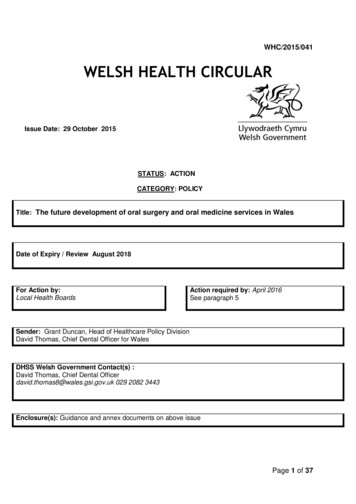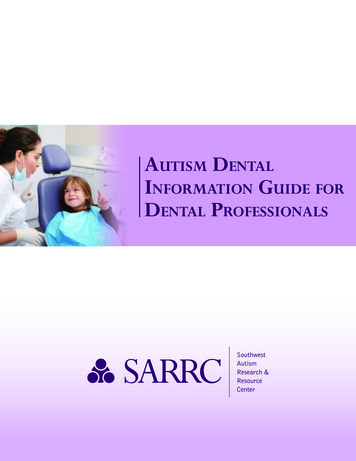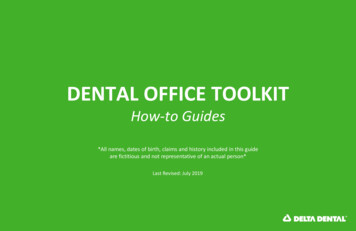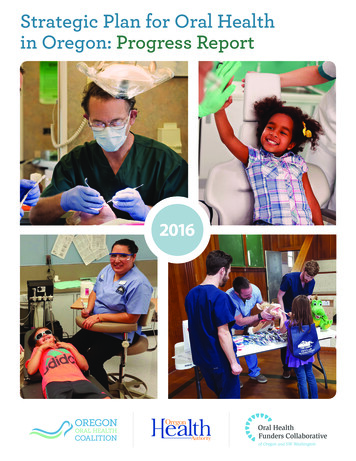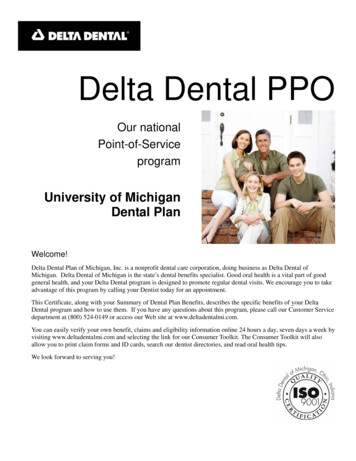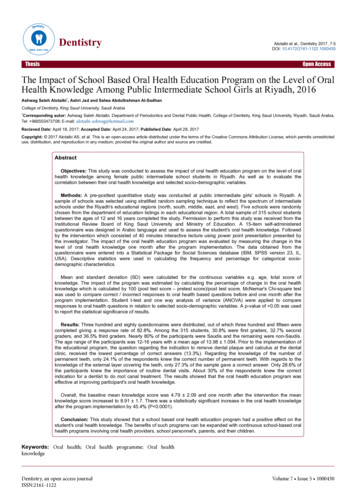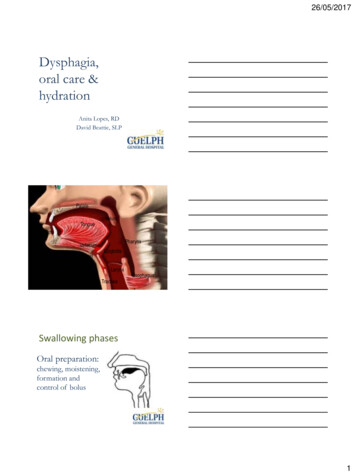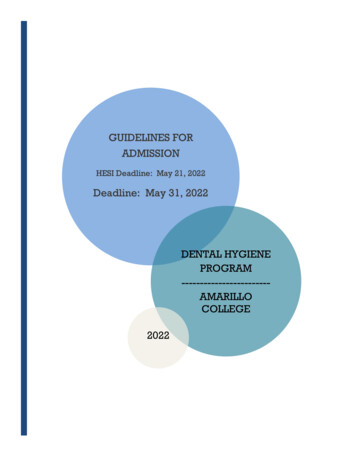
Transcription
Dental care andoral healthFactsheet 448LPJanuary 2015Good oral health is important for health and wellbeing. Because dementiais a progressive condition (meaning it gets worse over time) it is importantto establish a dental care programme at, or soon after, a diagnosis. Theprogramme should help to improve oral health and reduce the risk ofdeveloping poor oral and dental health. Maintaining oral health bringsbenefits in terms of self-esteem, dignity, social integration and nutrition.Poor oral health can lead to pain and tooth loss, and can negatively affectself-esteem and the ability to eat, laugh and smile.This factsheet describes some of the dental problems that people withdementia may face at different stages and methods for treatment andprevention, including maintaining good oral health. It also looks at issuesaround keeping and wearing dentures.Contentsnn Dental diseasennDrugs and dental problemsnnDenturesnnDaily care of teethnnHow to tell if someone has dental problemsnnDental treatmentnnFinding an NHS dentistnnDental care in care homesnnOther useful organisations.
2 Dental care and oral healthDental care and oral healthDental diseaseThere are two main types of dental disease: gum (periodontal) diseaseand tooth decay (dental caries, more commonly known as cavities). Bothof these can cause discomfort or pain and can lead to infection. Both painand infection can worsen the confusion associated with dementia.Gum diseaseGum disease can cause inflamed and bleeding gums, gum recession(where the gum tissue is reduced so the roots of the teeth becomeexposed), loose teeth and bad breath. It is caused by the build- up of dentalplaque (a combination of food debris and bacteria). Plaque leads to gumdisease if it is not removed by daily efficient brushing and flossing. Usinga tooth gel or mouth rinse containing chlorhexidine (an antiseptic anddisinfectant agent) can help to control gum disease for a person who isexperiencing bad breath and bleeding and inflamed gums.Tooth decayTooth decay is caused by the action of dental plaque on the teeth whenfood and drinks containing sugar are consumed. Plaque and sugartogether produce acid, which attacks the tooth, causing decay. Restrictingthe intake of sugar to two to three times a day, preferably at mealtimes,is important in guarding against tooth decay. It is the number of timesthat sugar is eaten during a day, rather than the total amount of sugarconsumed, that is important in reducing the risk of decay. This includeshidden sugars in food and drink, as well as sugar added to food or drinks. Ahealthy diet, good oral hygiene, and the use of toothpaste or a mouth rinsecontaining fluoride will also help prevent tooth decay.High-energy food supplements contain high levels of sucrose – a formof sugar. If they are used on a regular basis, it is important to keep themouth clean to minimise the risk of decay. Gum recession increases thechances of decay occurring at the necks of teeth (where the crown ofthe tooth meets the root at the gum) unless oral hygiene is excellent anddietary sugars are controlled. Food supplements may be prescribed to
3 Dental care and oral healtha person with dementia who is having difficulties with eating. When foodsupplements are prescribed for a person with natural teeth, it is importantto get advice on prevention from the dentist.Drugs and dental problemsPeople with dementia may be taking medication for a number ofconditions. They may also be prescribed antidepressants or – less often– antipsychotics and sedatives. A dry mouth is a common side effectof these drugs. Saliva acts as a lubricant and also cleans the mouth andteeth. Lack of saliva can lead to a build-up of plaque and increase the riskof dental decay, gum disease and infection. A dry mouth can also causeproblems with dentures, including discomfort and looseness. Denturefixatives and artificial saliva (a fluid to lubricate the mouth) can help somepeople with denture problems. The dentist will be able to offer advice torelieve discomfort and problems caused by lack of saliva or a dry mouth.Frequent sips of water throughout the day, especially at mealtimes, will help.Some antipsychotic drugs can cause involuntary repetitive tongue andjaw movements, making it difficult to wear dentures, particularly in thelower jaw. In some cases, these movements will continue after the drug isstopped. If this occurs, the dentist may be able to advise on what can help,and how best to ensure that the person is comfortable.If medication is syrup-based (for example lactulose), there is an increaseddanger of tooth decay. The doctor may be able to prescribe a sugar-freealternative if asked. The dentist may also be able to apply chlorhexidineand fluoride varnishes to help prevent decay at the necks of the teeth.DenturesA significant number of older people have partial or full dentures. Plaquecan easily build up on dentures. If partial dentures are worn, it is importantthat oral hygiene is well maintained or the plaque will accumulate andencourage gum disease and tooth decay.If the person loses all their natural teeth, they may need to start using fulldentures. They may have difficulty coping with their new set of dentures,and will need to be encouraged to persevere. This can also be an issue ifthe person loses their dentures and needs to start using a new set.
4 Dental care and oral healthDentures also need to be replaced when they become loose. Replacementdentures are best constructed using the dimensions of the old set. Forthis reason, the old set should always be retained and taken along to thedentist when the new ones are being constructed.Wearing denturesThe person with dementia should be encouraged to wear their dentures,and offered help with putting them in, for as long as possible. Dentures areimportant for maintaining dignity and self-esteem. If a person does notwear them it may affect their appearance, diet and ability to speak.Denture loss is common when people with dementia are in unfamiliarenvironments, for example, when they spend time in a residential homefor respite care. Replacing lost dentures can present problems (see‘Denture marking’). If the person is without their dentures for any lengthof time they may forget how to wear them, or they may lose their abilityto adapt to a new set. The person may also be unable to co-operate withthe dentist during the several visits required to make the new dentures.However, sometimes intervention by the carer (for example, hand-holdingor distraction through talking) may be all that is needed. If co-operation islimited, a realistic approach may be to provide an upper denture only, forthe sake of appearance.It can sometimes be difficult and distressing for relatives and carers whenthey are told that it will not be possible to successfully make a set of newor replacement dentures for the person with dementia. The decision notto provide new or replacement dentures would only be made after anindividual assessment and if it is in the person’s best interests.Eventually, many people with dementia reach a stage where they willno longer tolerate dentures in their mouth, even if they have worn themwithout problems in the past.Denture markingA person with memory problems associated with dementia may bemore likely to lose their dentures. Marking a person’s name on denturesmeans that lost dentures can often be returned. New dentures shouldbe permanently marked during their manufacture. Existing dentures can
5 Dental care and oral healthbe temporarily marked using a simple technique that will last for 6–12months. This can be done using a small piece of new kitchen scourer, apencil (or a pen that uses safe alcohol-based ink) and clear nail varnish.The process takes about ten minutes and can be carried out by a dentist, adental hygienist or a carer.The process is as follows:1 Clean, disinfect and dry the denture.2 Select an area near the back of the mouth on the outer surface of thedenture just large enough to have the person’s name on it, and use a newpiece of scourer to remove the surface polish from this area.3 Print the person’s name on the denture using a pencil or a pen that usessafe alcohol-based ink.4 Paint over the name with a thin coat of clear nail varnish and allow itto dry.5 Apply a second thin coat of varnish and allow it to dry.It is important to clean, disinfect and dry the denture thoroughly beforemarking it. Dentures should be checked periodically to ensure the name isstill legible, and the marking renewed as necessary.Daily care of teethEarly stages of dementiaSomeone in the early stages of dementia should carry out their own mouthcare for as long as possible. They may need to be reminded to do it, orthey may need to be supervised. The carer can give them the brush andtoothpaste and show them what to do. The person may find it easier to usean electric toothbrush or a toothbrush with an adapted handle to improvetheir grip.The dentist or dental hygienist may be able to advise the person andtheir carer on the best methods for preventing tooth decay and gumdisease in the particular circumstances. It is very important to establisha daily care routine in the early stages of dementia. This may include a
6 Dental care and oral healthhigh-concentration fluoride toothpaste and regular application of fluoridevarnish for people with natural teeth. Fluoride can be applied by the dentistevery three to four months.Later stages of dementiaAs dementia progresses, the person may lose the ability to clean theirteeth, stop understanding that their teeth need to be kept clean, or loseinterest in doing so. Carers may need to take over this task. A dentist orhygienist can provide guidance and support on how to assist in cleaninganother person’s teeth. The technique will vary depending on the individualconcerned. Generally, the easiest way is for the person with dementia tosit on a straight-backed chair with the carer standing behind. The carersupports the person against their body, cradling their head with one arm.They can then brush the person’s teeth using a dry toothbrush and a peasized amount of toothpaste.How to tell if someone has dental problemsThere may come a time when the person with dementia is unable to saythat they are experiencing pain or discomfort in their mouth or teeth. Theywill need to rely on other people to notice and interpret their behaviour andto arrange a visit to the dentist if necessary. There are several behaviouralchanges that may indicate that someone with dementia is experiencingdental problems. These may include:nnrefusal to eat (particularly hard or cold foods)nnfrequent pulling at the face or mouthnnleaving previously worn dentures out of their mouthnnincreased restlessness, moaning or shoutingnndisturbed sleepnnrefusal to take part in daily activitiesnnaggressive behaviour.If there is no explanation for the change in behaviour, arrangements shouldbe made to identify the cause. This should include a dental assessment aspart of the process.
7 Dental care and oral healthDental treatmentTypes of dental treatmentEarly stages of dementiaIn the early stages of dementia, most types of dental care are possible.The dentist will plan the treatment, bearing in mind that the person withdementia will eventually be unable to look after their own teeth. Key teethmay be identified and restored. Crowns, bridges and implants may onlybe considered if someone is prepared to carry out daily brushing for theperson with dementia should they reach a stage where they cannot dothis for themselves. Preventing further gum disease or decay is alsovery important at this stage. As dementia is a progressive condition, it isimportant for the person and their carer to obtain advice on preventionfrom the dentist.Middle stages of dementiaDuring this stage of dementia, the person may be relatively physicallyhealthy but might have lost some thinking abilities. The focus of treatmentis likely to be on prevention of further dental disease. Some people mayrequire sedation or general anaesthesia for their dental treatment. Thedecision will be based on the individual’s ability to co-operate, dentaltreatment needs, general health and social support. It is during the middlestages that issues around consent to treatment may start to arise (see‘Consent to treatment’ below).Later stages of dementiaIn the later stages of dementia, the person is likely to have severe problemswith thinking, reasoning and memory and will often be physically frail ordisabled with complex medical conditions. Treatment at this stage focuseson prevention of dental disease, maintaining oral comfort, and provision ofemergency treatment.Planning treatmentFor people with or without dementia, the recommended interval betweencheck-ups at the dentist should be determined specifically for theindividual and tailored to meet their needs, based on assessment and riskof dental disease. For adults, the shortest interval that is recommendedis three months, and the longest is two years. If treatment becomesnecessary for a person with dementia, the dentist (together with the
8 Dental care and oral healthperson and their family or carers) will discuss treatment needs and agreeon the best treatment plan. They should take into consideration:nnthe level of independence, co-operation, thinking abilities, mental state,and physical impairment of the person with dementiannwhat (if any) dental symptoms or problems the person is experiencingnnwhether the person is able to give informed consent (see ‘Consent totreatment’).Once these questions have been answered, the dentist will be able todecide on the most appropriate treatment. They will also decide howregularly they need to see the person.Regular mouth checks can highlight any problems so that they canbe treated as soon as possible. Cancer of the mouth, while generallyuncommon, is more likely to occur in older people than in any otherage group. It may start as a small painless ulcer and, if diagnosed early,treatment is relatively simple and has a high success rate. Even if a personhas no natural teeth or dentures, regular mouth checks are important toscreen for mouth cancer.Consent to treatmentIt is important that the person with dementia is given the opportunity tomake, or take part in, decisions about dental treatment. The dentist shouldexplain to the person in simple terms what is being done and why. Shortsentences that are phrased in a way where the person can answer ‘yes’ or‘no’ can be effective.When dental treatment is irreversible (for example, when teeth are going tobe taken out) and the individual cannot give informed consent, the familyand/or carers will usually be involved in the decision-making process. If thetreatment is out of the ordinary or there is disagreement about what is inthe best interests of the person, the dentist may seek a second opinion.The law states that every person is able to make their own decisions,unless it can be proven that they are not able to do so. If this is not clear,the dentist should carry out an assessment of the person’s capacity (the
9 Dental care and oral healthability of that person to make their own decisions). If the individual doesnot have capacity, family, professionals and other carers can be involvedin the decision-making process on their behalf, as long as these decisionsare in the person’s best interests. For more information see factsheet 460,Mental Capacity Act 2005.A person who has capacity can grant someone Lasting Power of Attorneyin England and Wales, or Enduring Power of Attorney in Northern Ireland,meaning they can take decisions about property, finances, health andwelfare if the person should lose capacity in the future. Where an individualhas been granted Lasting Power of Attorney or Enduring Power of Attorney,their wishes should be respected. For more information, see factsheet472, Lasting power of attorney or, in Northern Ireland, factsheet NI472,Enduring power of attorney and controllership.People without capacity who do not have family or friends to support themmay be appointed an independent mental capacity advocate to representthem in any decision over serious healthcare treatment. An examplemight be removal of some or all of their natural teeth, which may involvetreatment under sedation or a general anaesthetic.Coping with dental treatmentThe way dementia progresses varies considerably, as does the ability tocope with dental treatment. Some people are comfortable with a visit tothe dentist, while others may find the experience distressing.People who have had regular dental treatment throughout their lives oftencope better at a dental surgery. They may have little difficulty co-operatingwith simple procedures until their dementia is advanced. For other peoplewith dementia, the unfamiliar experience can increase their confusion,making treatment difficult or impossible.In these circumstances, the dentist may be prepared to make a homevisit. Alternatively, it can be helpful for the person with dementia to beaccompanied into the dental surgery by someone they know. The carercan remain in the person’s sight while they are having treatment and offerreassurance by holding the person’s hand.
10Dental care and oral healthFinding an NHS dentistIf the person with dementia already has a regular dentist, they shouldcontinue to see the same dentist for routine treatment and preventiveadvice. If the person goes into residential care, it is important that theycontinue to have access to a dental service; ideally this would be theperson’s regular dentist.If they do not have a dentist, they will need to find one that is acceptingnew patients. It is no longer necessary to be registered with a dentistto receive treatment, but dentists will usually keep lists of their regularpatients. If someone asks for an appointment, the dental practice will tryto offer one as soon as possible at a convenient time within the hours thepractice has set aside for NHS patients.Although some dental practices will contact their patients to arrangecheck-ups, many dental practices do not send out reminders, so it isimportant that a person with dementia has someone to remind them tomake an appointment. It is recommended that a person diagnosed withdementia who has their own natural teeth is seen by a dentist everysix months.Some dentists will see people at home. This can be less stressful andconfusing for the person, and may increase co-operation.If the person’s dementia reaches a point where their dentist can nolonger manage their treatment needs, they might be referred to the localsalaried community dental service or local specialist dental service. Theseservices act as a safety net for people who are unable to receive carefrom a general dental practitioner (high-street dentist). The dentists areusually experienced in providing dental care for people with disabilitiesand complex medical conditions. Details of the local community dentalservice can be obtained from the local primary care organisation (England),the local health board (Wales) or the local trust (Northern Ireland). If youhave a problem identifying the relevant organisation where you live, pleasecontact your local Alzheimer’s Society for advice. (For more information onNHS dental services, see ‘Other useful organisations’.)
11Dental care and oral healthDental care in care homesCare homes have a duty to ensure that their residents’ healthcare needsare met. This includes dental care. The care home manager should be ableto supply information about their arrangements for dental care. They mayhave a local dentist who visits the home to provide regular check-ups, orthey may have visits from a local community dental care service.Other useful organisationsAll Wales Special Interest Group / Oral Health Care (SIG)sigwalesscd@gmail.comwww.sigwales.orgAn advisory group of special care dentists and dental care professionalsworking in the Community Dental Service and Hospital Dental Service inWales. The website includes advice and resources for the public.Business Services Organisation (Northern Ireland)0300 555 0113www.hscbusiness.hscni.net/servicesProvides a range of regional business support functions andspecialist professional services to the health and social care sector inNorthern Ireland. The website includes lists of all registered dentists inNorthern Ireland.British Society of Gerodontology ntact-us (contact form)Aims to protect, maintain and improve the oral health of older people. Itprovides advice and guidance for the public on its website.
12Dental care and oral healthNHS Choiceswww.nhs.uk/service-search (find services)NHS Choices is a comprehensive information service that helps to putpeople in control of their healthcare. The website offers advice andinformation on NHS services in England, including a directory of dentists.NHS Direct Wales0845 4647www.nhsdirect.wales.nhs.uk/localservicesNHS Direct Wales is a health advice and information service available24 hours a day, every day. The website includes a section on how to findinformation on dental practices in Wales.
Factsheet 448LPLast reviewed: January 2015Next review due: January 2018Reviewed by: Dr Janet Griffiths, former Specialistin Special Care Dentistry and Dr Vicki Jones,Consultant in Special Care DentistryThis factsheet has also been reviewed bypeople affected by dementia.A list of sources is available on request.Alzheimer’s Society National Dementia HelplineEngland, Wales and Northern Ireland:0300 222 11229am–8pm Monday–Wednesday9am–5pm Thursday–Friday10am–4pm Saturday–SundayThis publication contains information and generaladvice. It should not be used as a substitute forpersonalised advice from a qualified professional.Alzheimer’s Society does not accept any liability arisingfrom its use We strive to ensure that the content isaccurate and up to date, but information can changeover time. Please refer to our website for the latestversion and for full terms and conditions. Alzheimer’s Society, 2017. All rights reserved.Except for personal use, no part of this work may bedistributed, reproduced, downloaded, transmitted orstored in any form without the written permission ofAlzheimer’s Society.Alzheimer’s Society operates in England, Wales andNorthern Ireland. Registered charity number 296645.alzheimers.org.ukAlzheimer’s Societyis the UK’s leadingdementia charity. Weprovide informationand support,improve care, fundresearch, and createlasting change forpeople affected bydementia.
Dental care and oral health. Factsheet 448. LP. January 2015. Good oral health is important for. health and wellbeing. Because dementia is a progressive condition (meaning it gets worse over time) it is important to establish a dental care programme at, or soon after, a diagnosis. The programme should help to improve oral health and reduce the .

